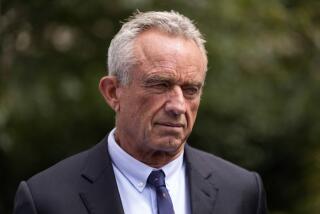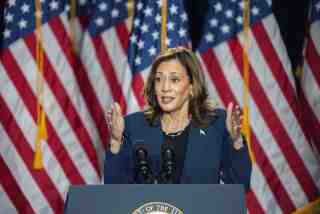White House Bid for Jerry Brown? : Politics: The former state Democratic Party chairman and possible candidate for U. S. Senate says he is ‘not un-thinking about it.’
- Share via
Former California Gov. Edmund G. (Jerry) Brown Jr. has cracked open the door to a bid for the 1992 Democratic presidential nomination.
Encouraged by the response to his populist message, Brown has begun to discuss with a handful of close friends and advisers--including longtime Democratic strategist Patrick Caddell--the possibility of joining the thin field of Democratic presidential contenders, several sources said. At least one close Brown adviser has discreetly begun to seek out some of the logistical help that would be required in the early stages of a presidential campaign.
Asked in an interview if he was contemplating entering the Democratic presidential race, Brown said: “I will say to you what I have said privately to someone else. Someone asked me are you thinking about it. I said, I am not un-thinking about it.”
Since resigning as Democratic state party chairman last February, Brown has been exploring a race for the U. S. Senate seat being vacated by Democrat Alan Cranston. But, Brown said, “the exploration has gone further than I anticipated . . . I have not foreclosed any options. People have talked to me (about running for President), and I have had conversations.”
Brown, 53, has run for President twice before--in 1976, when he won several late primaries, and four years later when he finished a poor third to Jimmy Carter and Sen. Edward M. Kennedy. Brown last ran for office in 1982, when he lost a Senate race to Republican Pete Wilson. And many political insiders are likely to greet the news of his interest in a third try for the presidency with a mixture of derision and incredulity.
“People have got a set of prejudices, biases and experiences with him . . . that is going to be a real challenge for him to overcome,” said one leading Democratic strategist.
The likelihood of political professionals strafing his trial balloon won’t shape his decision on whether to join the presidential race, Brown said.
“I really believe the power of these ideas demand a hearing, and demand a very articulate exposition and that is basically what I am committed to, wherever it leads and whatever its consequences, he said.”
He said he would announce his plans “in about a month or so.”
If his path led him onto the presidential track, Brown would begin as very much a dark horse. Even after more than eight years out of office, he remains a controversial and polarizing figure in California. In some Eastern political circles, he is remembered primarily as the flaky “Gov. Moonbeam” lampooned in Doonesbury cartoons. His tenure as state party chairman ended in controversy, with some Democrats criticizing him for failing to raise enough money to fund an adequate get-out-the-vote effort in last fall’s governor’s race.
As much as anything else, Brown’s interest in the presidential race may reflect the extraordinary lack of definition in the Democratic contest less than seven months before the first contest in Iowa. The only announced Democratic contender, former Massachusetts Sen. Paul E. Tsongas, last won an election in 1978, the same year Brown did. Although two senior party figures--New York Gov. Mario M. Cuomo and Sen. Albert Gore Jr. of Tennessee--have not yet declared their intentions, the Democrats most actively exploring candidacies are relatively unknown on the national stage: Arkansas Gov. Bill Clinton, and Sens. Tom Harkin of Iowa and John D. (Jay) Rockefeller IV of West Virginia.
“It’s not surprising when there is this dearth of candidates that he would toy with the idea,” said one California Democrat who has worked closely with Brown.
Asked why he was considering the race, Brown said, “just the incredible vacuum, the absence of any real opposition to the reigning ideas that are basically undermining the country.”
In sharply worded speeches and radio addresses, Brown recently has been rebuilding his political identity around such a call for fundamental change, striking outsider notes common to national campaigns in which Caddell has been involved.
An energetic fund-raiser during his gubernatorial and earlier Senate races, Brown has evolved over the past few months a withering rhetorical attack on the influence of money in politics that is likely to serve as the basis for whatever campaign he runs next year. (In his current exploration of the Senate race, Brown has limited himself to contributions of $100 or less.)
In recent appearances, Brown has linked the widening inequality of income during the 1980s with the dependence of politicians in both parties on the wealthy and special-interest groups for campaign contributions.
“The quid pro quo could not be more straightforward or insidious,” Brown declared in a mid-July commentary on KABC radio. “In return for massive campaign contributions, the forces of greed and special privilege receive the institutional support of government to accomplish their selfish agenda--almost without exception to the detriment of the national interest and at the expense of the American people.”
Several sources close to Brown said he is skeptical that a single senator can make much headway against these trends. That conviction, others say, is reinforced by the larger fact that Brown has never surrendered his hope of finding a way to the White House.
In an interview on the Michael Jackson radio show last week, Brown virtually said as much, declaring: “In our system, it seems that only presidential candidates, or governors perhaps in a state context, can raise the level of challenge that gives people a choice. . . . In some ways I’ve been thinking lately and hearing in my mind what (Republican presidential candidate Barry) Goldwater said back in 1964: ‘What’s required is a choice not an echo.’ ”
More to Read
Get the L.A. Times Politics newsletter
Deeply reported insights into legislation, politics and policy from Sacramento, Washington and beyond. In your inbox twice per week.
You may occasionally receive promotional content from the Los Angeles Times.







